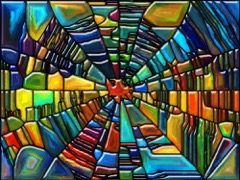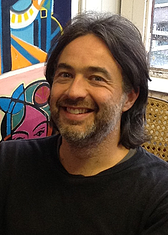A guest post by Bonnie Bright, Ph.D.
C.G. Jung contended that our personalities are made up of a multitude of archetypes, Dr. Keiron Le Grice, Chair of the Jungian and Archetypal Studies program at Pacifica Graduate Institute, reminded me when he recently sat down with me to share his insights into the field of depth psychology. Each archetype asserts its own aims, moods, and ideas on our personalities, influencing our lives on a day-to-day basis. Jungian and depth psychologies, by aiming to make what is unconscious conscious, offer an entrance point into recognizing and understanding the various deep forces that move through us from one day to the next, engendering a deep comprehension of the psyche and the motivations, instincts, and impulses that are at work in our lives.
 Individuation, a term coined by Jung, is a way that we can come to terms with this multiplicity of forces, and to attune to a greater organizing force, perhaps looked at as “the god within.” An archetypal view can enable us to find deep meaning in life, Keiron notes. We live in a time when we no longer have a religious, spiritual, or mythological framework to provide orientation in our lives. To be able to turn within, through the study of dreams and synchronicities that occur to us, through direct engagement with the unconscious and through spiritual experiences, we can begin to find our own personal sense of meaning. When we encounter the numinous, (a term coined by Rudolf Otto and adopted by Jung), that tremendous and fascinating mystery that underlies our experience can ground us in our own spiritual and moral autonomies. We need to each find our own individual myth at a time when the collective myths are rendered invalid by the dominant scientific rational perspective in the western worldview.
Individuation, a term coined by Jung, is a way that we can come to terms with this multiplicity of forces, and to attune to a greater organizing force, perhaps looked at as “the god within.” An archetypal view can enable us to find deep meaning in life, Keiron notes. We live in a time when we no longer have a religious, spiritual, or mythological framework to provide orientation in our lives. To be able to turn within, through the study of dreams and synchronicities that occur to us, through direct engagement with the unconscious and through spiritual experiences, we can begin to find our own personal sense of meaning. When we encounter the numinous, (a term coined by Rudolf Otto and adopted by Jung), that tremendous and fascinating mystery that underlies our experience can ground us in our own spiritual and moral autonomies. We need to each find our own individual myth at a time when the collective myths are rendered invalid by the dominant scientific rational perspective in the western worldview.
Keiron became interested in spirituality in his late teens, particularly dedicating himself to learning astrology (which led him to Jung’s writings), then studying philosophy and psychology at university in England. Disappointed at how mainstream academia bypassed Jungian ideas, Keiron read most of Jung’s Collected Works in his spare time, and pursued the work of Joseph Campbell after seeing him interviewed by Bill Moyers for The Power of Myth. He found himself most impressed with Jung’s Two Essays on Analytical Psychology, written in the 1920s, which focused on the role of archetypes in individuation, and described how these ideas really gripped him. He felt like he was tapping into a deep current in his life, he declares. In his late twenties, his interests in astrology, Jung, and Campbell evolved into a book, The Archetypal Cosmos, which was ultimately published in 2010.
For people who are predisposed to find their way in this field, there’s a “right time,” Keiron maintains. For him, discovering depth psychology so early in his life was perhaps something of an impediment to participating in the world because when one is powerfully drawn to the depths of the psyche, it can have a tendency to pull us away from the world, a concept even Jung made note of in his many writings. After having some profound spiritual experiences in his late teens and early twenties, Keiron reveals how he made a conscious decision to put some of it aside for a while and “build his ego” in Jungian terms. He believes, however, that his early exposure was helpful, providing a strong foundation as he took time to integrate and really discern which ideas were relevant and valuable to him and which were not.
Now, years later, as professor and chair of a Jungian and Archetypal studies program, Keiron is keenly aware that the “gifts” of Jungian and depth psychology are that they empower the individual to find a spiritual, mythic, or symbolic mode of being in the world, which, in his words, can counter a sense of existential meaningless which is so prevalent today. It may well be the responsibility of depth psychology practitioners to bring awareness and recognition around the dark side of the unconscious energies that have not been brought into conscious awareness and which manifest in destructive ways, he asserts.
In the Gospel of Thomas, Keiron points out, it says that if you “bring forth what is deep within you, it will save you, but if you do not bring that forth, what is within you will destroy you.” Some of that unconscious destructive energy seems to be surfacing in our time, so the more we can be aware of it, the more we can engage to mitigate it. We need to be able to channel the forces at work in the world constructively, in service of the deep psyche. The challenge of our time for those in depth psychology is to be able to communicate the tenets to a new audience, Keiron believes, to somehow convey the integrity of the ideas through a new medium in a way that they are not rendered superficial. It’s critical to connect people and bring them into community into a web, akin to the noosphere discussed in the writings of French philosopher and paleontologist Teilhard de Chardin (1881-1955).[i]
Keiron has recently published a new book called Archetypal Reflections: Insights and Ideas from Jungian Psychology, which emerged in a way from exactly that kind of archetypal web he refers to. It is a compilation of short writings and reflections Keiron initially made online in the form of posts to graduate students in the hybrid Jungian and Archetypal Studies program at Pacifica. These reflections encompass a variety of depth psychological topics organized into themes, including archetypes, individuation, synchronicity, the evolution of consciousness, and the mind/matter relationship among them, delving into material that is essential for both seasoned scholars of depth psychologies as well as those who are new to it.
In discussing his current role in depth psychology, Keiron notes how gratifying it is to see students in the Jungian and Archetypal Studies program—who typically arrive in answer to some sort of call from psyche to be there—move from a more tentative longing to study these kinds of esoteric topics to really moving into a place of maturity, authenticity, and authority as they write about what resonates most with them. At Pacifica, Keiron and other faculty members really strive to cultivate the art of critical thinking for students to bring their own engagement and insight into the field in order to find their own truths in what typically ends up being a profoundly transformative journey.
Hearing Keiron mention this brings back warm memories of my own time doing coursework at Pacifica. I’m compelled to point out that there’s a kind of an inside joke among students there that it’s the “Hogwarts” (of Harry Potter fame) of graduate schools, a place that provides opportunities to learn concepts and skills that truly seem magical in many aspects. It definitely brings us into a more enchanted way of being in the world, Kieron confirms, and therefore counters the disenchantment of the modern worldview, bringing about opportunities to engage with the numinous, the spiritual power and mystery that shines through the psyche in so many ways.
Listen to the full interview with Keiron Le Grice here (Approx. 36 mins.)
Click Here to learn more about the Jungian and Archetypal Studies program at Pacifica.
 Keiron Le Grice is a professor of depth psychology and chair of the Jungian and Archetypal Studies Specialization at Pacifica Graduate Institute, Santa Barbara, where he teaches courses on archetypes, alchemy, synchronicity, and the history of depth psychology. He was educated at the University of Leeds, England (B.A. honors, Philosophy and Psychology) and the California Institute of Integral Studies in San Francisco (M.A., Ph.D., Philosophy and Religion). Keiron is the founding editor of Archai: The Journal of Archetypal Cosmology, and the author of four books––The Archetypal Cosmos, Discovering Eris, The Rebirth of the Hero, and the recently published Archetypal Reflections: Insights and Ideas from Jungian Psychology. He has also taught for Grof Transpersonal Training (UK) and is commissioning editor for Muswell Hill Press in London.
Keiron Le Grice is a professor of depth psychology and chair of the Jungian and Archetypal Studies Specialization at Pacifica Graduate Institute, Santa Barbara, where he teaches courses on archetypes, alchemy, synchronicity, and the history of depth psychology. He was educated at the University of Leeds, England (B.A. honors, Philosophy and Psychology) and the California Institute of Integral Studies in San Francisco (M.A., Ph.D., Philosophy and Religion). Keiron is the founding editor of Archai: The Journal of Archetypal Cosmology, and the author of four books––The Archetypal Cosmos, Discovering Eris, The Rebirth of the Hero, and the recently published Archetypal Reflections: Insights and Ideas from Jungian Psychology. He has also taught for Grof Transpersonal Training (UK) and is commissioning editor for Muswell Hill Press in London.
 Bonnie Bright, Ph.D., is a graduate of Pacifica’s Depth Psychology program, and the founder of Depth Psychology Alliance, a free online community for everyone interested in depth psychologies, She also founded DepthList.com, a free-to-search database of Jungian and depth psychology-oriented practitioners, and she is also the creator and executive editor of Depth Insights, a semi-annual scholarly journal. Bonnie regularly produces audio and video interviews on depth psychological topics. She has completed 2-year certifications in Archetypal Pattern Analysis via the Assisi Institute and in Technologies of the Sacred with West African elder Malidoma Somé, and she has trained extensively in Holotropic Breathwork™ and the Enneagram.
Bonnie Bright, Ph.D., is a graduate of Pacifica’s Depth Psychology program, and the founder of Depth Psychology Alliance, a free online community for everyone interested in depth psychologies, She also founded DepthList.com, a free-to-search database of Jungian and depth psychology-oriented practitioners, and she is also the creator and executive editor of Depth Insights, a semi-annual scholarly journal. Bonnie regularly produces audio and video interviews on depth psychological topics. She has completed 2-year certifications in Archetypal Pattern Analysis via the Assisi Institute and in Technologies of the Sacred with West African elder Malidoma Somé, and she has trained extensively in Holotropic Breathwork™ and the Enneagram.



